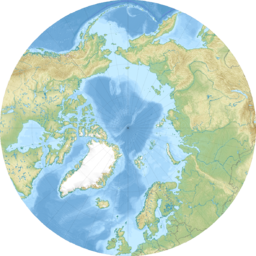Lake North Pole, also known as The North Pool, is a small, shallow pond near the North Pole, and is currently the northernmost pond in the world. It came into existence in 2002, occurring each year, then freezing over in the winter.[2]
| Lake North Pole | |
|---|---|
| The North Pool | |
| Coordinates | 85°N 5°W / 85°N 5°W[1] |
| Average depth | Approx. 40 cm (16 in) |
| Frozen | Annually |
| Islands | None |
The pond, which is approximately one foot deep, is composed almost entirely of fresh water melted from the ice beneath.[1][3]
A web camera is stationed beside the pond to monitor changes. It was built by the Polar Science Center.[1]
On July 26, 2013, the depth was estimated to be approximately 40 cm.[1]
Members of the scientific community are not alarmed by such bodies of water, stating that they occur widely, and often refer to them as "melt ponds".[1][4]
This article needs to be updated. (April 2022) |
See also
editReferences
edit- ^ a b c d e "NPEO Web Cameras". Psc.apl.washington.edu. Retrieved 2013-07-29.
- ^ "Melting Ice Forms Lake at North Pole, researchers worried". Austrian Tribune. Archived from the original on 2014-07-28. Retrieved 2013-07-29.
- ^ "Ice Near the North Pole Has Melted. Again. - Eric Levenson". The Atlantic Wire. 2013-07-24. Archived from the original on 2013-07-27. Retrieved 2013-07-29.
- ^ David Clark Scott (July 27, 2013). "Debunker: New lake on North Pole sea ice? Not really". Alaska Dispatch. Archived from the original on 2013-08-02. Retrieved 2013-07-29.
External links
edit- January 21, 2013 Executive Summary of the National Oceanic and Atmospheric Administration's Arctic Report Card discussing melting ice.
- Webcam and images at the North Pole Environmental Observatory website
